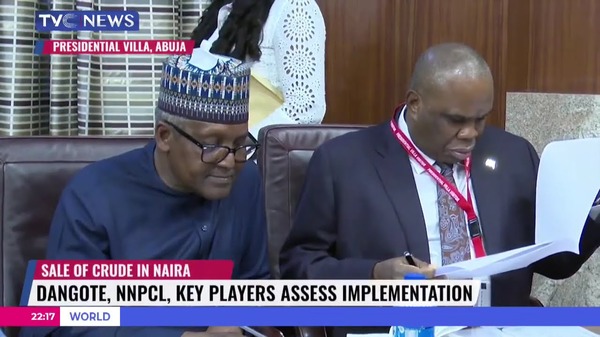The President of Dangote Refineries and Petrochemicals, Aliko Dangote, has advised the Nigerian National Petroleum Company Limited (NNPCL) and oil marketers to stop the importation of petrol.
He told them that his Dangote Refinery is capable of meeting all local needs.
Mr Dangote spoke after a meeting of the Implementation Committee on Crude Oil and Refined Products Sales in Naira in Abuja, which he attended.
President Bola Ahmed Tinubu, who hosted the meeting at Aso Villa, explained that the sale of crude in naira would put the oil sector on an effective lane.
Chairman of the Committee and Finance Minister, Wale Edun, told State House correspondents that the sale of crude in naira to local refiners had set the economy on the path of industrialisation and modernisation.
Mr Edun led NNPCL Group Chief Executive Officer (GCEO) Mele Kyari; Central Bank of Nigeria (CBN) Governor Yemi Cardoso and Federal Inland Revenue Service (FIRS) Chairman, Zach Adedeji who are members of the committee to the meeting.
Others who attended are Nigerian Midstream and Downstream Petroleum Regulatory Authority (NMDPRA) Chief Executive Farouk Ahmed and his Nigerian Upstream Petroleum Regulatory Commission (NUPRC) counterpart, Gbenga Komolafe.
He highlighted the positive trajectory of Nigeria’s economy following recent market-driven reforms, particularly in foreign exchange and petroleum product pricing.
The Finance minister noted that the policies were paving the way for industrial growth and private-sector investment.
He explained that the market pricing of foreign exchange was steering the country toward industrialisation by facilitating private-sector refining of crude oil.
He pointed out that local crude refining had bolstered the availability of raw materials, not only for Agriculture but for a range of industries, including chemicals, paints, building materials, and textiles.
The reforms, according to him, align with President Tinubu’s broader economic strategy, which prioritises an enabling environment for private sector investment, job creation, and economic expansion.
The minister also highlighted the benefits of market-driven pricing for petroleum products, which he said has strengthened the NNPCL’s financial stability.
Edun added that this shift is empowering federal, state, and local governments with increased revenue to fulfil essential obligations, from paying public sector salaries to funding social services and infrastructure projects.





